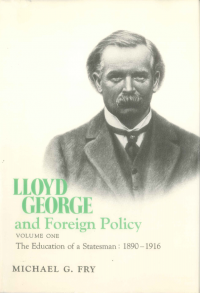Highlighting an overlooked aspect of Lloyd George's career

Up until the First World War David Lloyd George was regarded as a politician focused predominantly upon domestic issues. Having championed such causes as old age pensions, Welsh Disestablishment, and women's suffrage, he was more commonly associated with national subjects than the foreign policies that would define his tenure as prime minister and shape much of his legacy. As Michael Graham Fry demonstrates, though, this impression is a misleading one. His book, the first half of a two-volume study, traces Lloyd George's engagement with foreign policy prior to becoming prime minister in an effort to chronicle the development of the views he would apply once he won the highest of offices.
Fry beings by situating Lloyd George in the world of his youth, showing him to be a product of the Nonconformist and Welsh nationalist currents rushing through Wales in the late 19th century. From this he developed a view of international affairs that framed issues in moral terms, a perspective that was subsequently reflected in the public rhetoric he used in presenting issues to his audiences. He first came to national attention with his criticism of the war in South Africa, the nuance of which was obscured with his labeling as a "pro-Boer." When the Liberals formed a government in 1905 Lloyd George took office first as President of the Board of Trade, then in 1908 as Chancellor of the Exchequer. While these offices were focused more on economic and fiscal matters, Fry draws out his subject's role in shaping foreign policy during these years, finding within them an ongoing evolution of his views on international issues. He highlights Lloyd George's growing concern about Germany during this period, which was reflected both in advocacy for a naval agreement and in his speeches and Cabinet efforts in 1911 during the Agadir crisis. This puts his support for joining the war in 1914 look less like a betrayal of his earlier views and more a product of the development of his views over time, with his subsequent embrace of a vigorous war effort paving the way for his assumption of the premiership in 1916.
By detailing the development of Lloyd George's engagement with foreign policy, Fry provides readers with an invaluable study of his subject. Yet the value of Fry's analysis is hampered by his writing, as it oscillates between extremes of sweeping generalizations and a morass of detail. A better balance between the two would have allowed Fry to make his arguments more effectively, but those willing to take their time with Fry's text will be rewarded with an astute examination of the intellectual and political development of a key 20th century statesman.
 6
6






